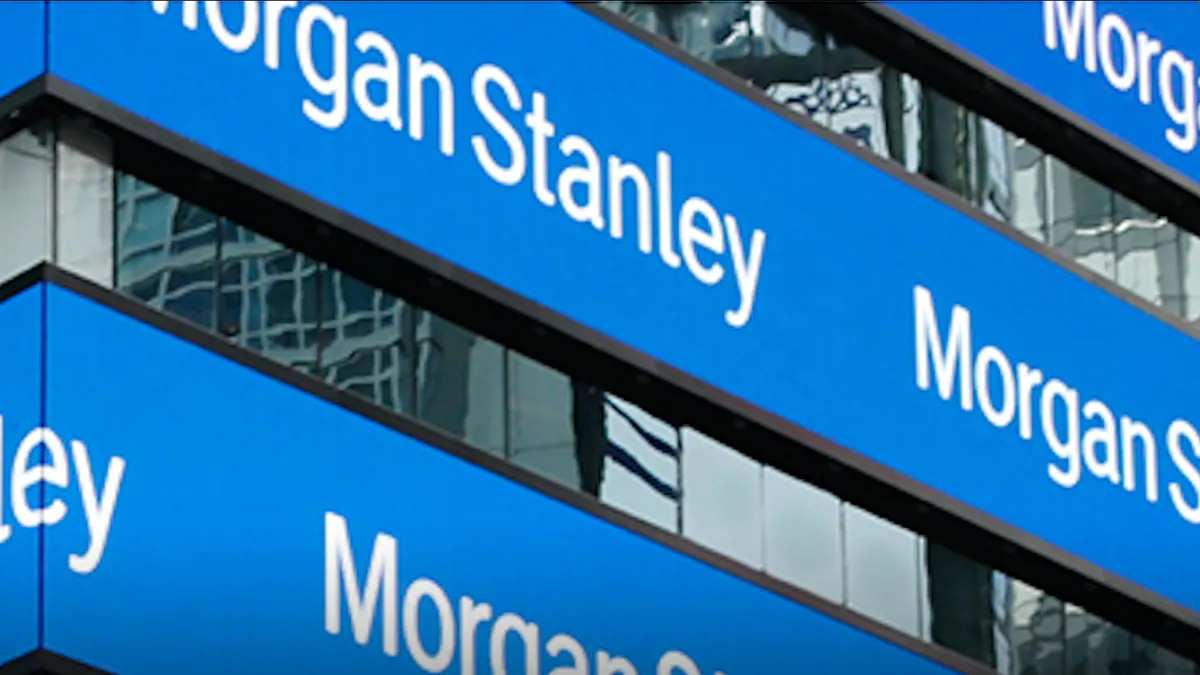Dive Brief:
- The coronavirus pandemic is erasing the gains fintechs have made in recent years at the expense of big banks, Morgan Stanley CEO James Gorman said Tuesday at a virtual conference the bank hosted. Clients are gravitating toward the "biggest, stable institutions" in a "flight to quality," he said.
- A surprise turnaround in U.S. employment figures in May "suggests that the worst is behind us" with regard to the coronavirus's impact on economic growth, Gorman said, adding U.S. banks should continue paying dividends.
- Morgan Stanley expects to pursue acquisitions in asset management, Gorman said. "I am not shy about doing deals that hit our sweet spot," he said, according to Bloomberg. The investment bank agreed to buy E*Trade in February for $13 billion in the wealth-management space. Gorman said he expects that deal to close by the end of the year.
Dive Insight:
Deposits at the 25 largest U.S.-based commercial banks rose by about $1.3 trillion from the end of February through May 27, according to Federal Reserve data.
Gorman cited a spate of disruptions in early March at stock trading app Robinhood as evidence that customers deserve better — and they're proving it by fleeing to big banks.
"There were some major outages with some of the new online robo players," Gorman said. "That doesn't work. You can't not access your account for several days."
A Robinhood outage March 2 prevented users from buying and selling shares for most of a trading day in which the Dow Jones Industrial Average saw its largest one-day gain since 2009. The company sent affected users an emailed apology offering a $75 goodwill credit. Attorneys accused Robinhood of using the credit to persuade customers to waive their right to participate in a class-action suit against it.
"A lot of the nonbanks are having some real challenges at the moment," Brendan Coughlin, consumer banking head at Citizens Bank, said Tuesday at the conference, according to Bloomberg.
Dean Athanasia, Bank of America's consumer and small-business chief, put a figure to big banks' recent gains, saying the bank's customers have opened nearly 300,000 new investment accounts on the company's Merrill Edge platform.
Athanasia also offered support to Gorman's assertion that the economy is recovering. Requests for payment deferrals on consumer loans through the country's second-largest bank fell 80% from April to May. June's deferral requests were at 10% of those May levels, he said, according to the Financial Times.
Delinquency rates among JPMorgan Chase's borrowers were "meaningfully better than what you would have expected with unemployment anywhere close to these levels," Gordon Smith, the bank's co-president, told the conference.
"I feel much more optimistic than pessimistic about what the next number of quarters are going to look like," he said.
For his part, Gorman said he expected Morgan Stanley's second-quarter loan loss charges to be lower than in the previous three months, adding that the bank was already seeing some of its bad loans "recovering."
With that said, he pushed for U.S. banks to pay dividends to shareholders. "What is the policy reason to shut down the dividend, other than that you can?" he said. "Yeah, more capital will always feel more prudent, but it’s not more prudent if it's at the expense of [shareholders] getting a decent income when they need a decent income."
U.S. banks in March suspended share buybacks — a bigger haul than dividends. But Gorman pressed to restart those, too. There's "no reason why," he said, "when we have enough clarity around the economic outlook, we wouldn't be instituting our buy back again."
Gorman's aggressive stance strikes a contrast against his cautious tone as the pandemic first took hold in March. His bank was the first systemically important U.S. bank to pledge not to lay off any employees throughout 2020. Gorman said in a March memo that by year's end, "we will know what we are dealing with, and hopefully the economy will be on the mend by then." The May employment figures appear to have pushed up Gorman’s assuredness on economic recovery. At the time he wrote the March memo, Gorman himself was recovering from the coronavirus.
European banks have been asked to suspend dividends to preserve their capital and absorb loan losses. Former FDIC Chair Sheila Bair, for one, has urged U.S. regulators to do the same.
Gorman said Tuesday he’d be willing to make deals to get Morgan Stanley to its “sweet spot.”
That sweet spot, Gorman said two years ago, would entail the bank doubling its size in the next five years.
However, the CEO said Tuesday the mergers and acquisitions market was “basically dead” for the second half of the year. He said he’d be reluctant to take on a large-scale acquisition in the asset-management industry.
“Doesn’t mean there’s a zero chance, but certainly my bar and the board’s bar on that is much higher,” Gorman said.














